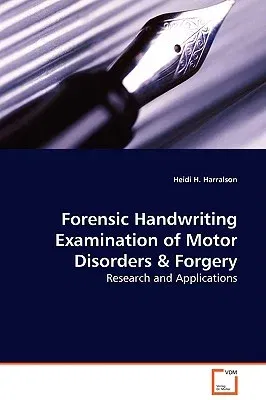Heidi H Harralson
(Author)Forensic Handwriting Examination of Motor Disorders & Forgery - Research and ApplicationsPaperback, 29 December 2008

Qty
1
Turbo
Ships in 2 - 3 days
In Stock
Free Delivery
Cash on Delivery
15 Days
Free Returns
Secure Checkout
Print Length
80 pages
Language
English
Publisher
VDM Verlag
Date Published
29 Dec 2008
ISBN-10
3639096770
ISBN-13
9783639096774
Description
Product Details
Author:
Book Format:
Paperback
Country of Origin:
US
Date Published:
29 December 2008
Dimensions:
22.86 x
15.24 x
0.43 cm
ISBN-10:
3639096770
ISBN-13:
9783639096774
Language:
English
Location:
Saarbrucken
Pages:
80
Publisher:
Weight:
117.93 gm

